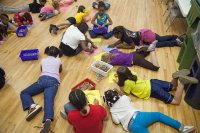Powerful SEL Is Happening After School, Too
New research shows that when schools extend SEL lessons beyond the classroom into after-school programming, students’ academic skills and classroom behaviors improve.
Your content has been saved!
Go to My Saved Content.Many schools teach social and emotional learning (SEL) during the school day, but there’s far less emphasis on extending those lessons into another part of students’ lives: after school.
While traditional after-school programs, like soccer and chess club, often include instruction around skills such as collaboration and persistence, writes Kate Stringer for The 74, “what is new is a growing interest in designing after-school programs that are intentional about teaching these skills, especially as research indicates they impact not just academics but also life outcomes and well-being.”
Educators say there is significant value in reinforcing SEL learning in other settings—after-school happens to provide a highly accessible opportunity to do so outside the classroom. “Social-emotional learning is kind of an every-moment thing, meaning it’s in every interaction, it’s in all relationships, and so it doesn’t turn on and off depending on the setting,” said Stephanie Jones, the Gerald S. Lesser professor of child development and education at Harvard University’s Graduate School of Education. “One thing that’s interesting about making it an intentional focus in schools and in out-of-school time is that those two settings are so different, the demands are different, the activities are different, and it’s a way to think about how can we build and transfer them from one setting to the other.”
In a 2017 examination of social and emotional learning outside of the classroom setting for the Harvard Graduate School of Education, Jones and a team of researchers found that out-of-school settings, “tend to be less formal and structured, offering increased opportunities to develop the type of close, trusting relationships that enhance SEL.” The study also noted that SEL outcomes improved when children were given opportunities to practice SEL skills across settings—the classroom, after school, and even at home—and when adult expectations across all these environments are aligned.
And 2019 research shows that an after-school SEL program named Wings for Kids is improving both the participants’ behavior and their social and emotional skills in the classroom. Founded 20 years ago with the purpose of bringing free SEL to at-risk kids in low-income communities, Wings provides a structured SEL after-school program—there are lots of opportunities for play—in a variety of Title 1 elementary schools in Georgia and North and South Carolina. The nonprofit partners with after-school organizations like Boys & Girls Clubs and the YMCA to offer workshops and training for teachers and administrators.
Among the study’s findings, researchers noted that kindergarten and first-grade students who participated in the Wings after-school program over the course of two years (as opposed to just one year, after which results weren’t apparent) showed improved self-awareness, self-regulation, executive function, and decision-making. Students’ reading and vocabulary skills also improved.
“The message that schools need to get is that the almost-exclusive emphasis on improving math and reading instruction as the way to improve long-term effects is a flawed model,” study author David Grissmer, a research professor at the University of Virginia, told The 74’s Stringer. “The long-term effects depend on kids developing a broader set of skills than just what they learned in math and reading instructions, skills of executive function, social-emotional skills, [visual-spatial] skills and what we call curiosity-based general knowledge.” Grissmer and his team concluded that the longevity and consistency of an after-school SEL program matter a great deal when it comes to outcomes.
For Tre’ Cobbs, who has worked as a Wings program coordinator for six years, the impact of the program hits a personal note. “Seeing the kids we serve have a form of self-realization and seeing, ‘Oh, these are actually skills I need in my life. I need to know how to be kind to people. I need to know how to read people’s body language... and, you know, ultimately live cohesively with everybody else,’” Cobbs told Stringer. “For me, to see it in kindergarten and for me to see that in fifth graders in the areas we serve is a rare sighting, and it’s good to see and inspiring. I didn’t have those kinds of opportunities growing up.”
